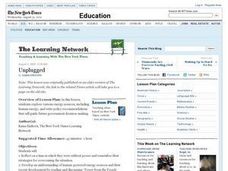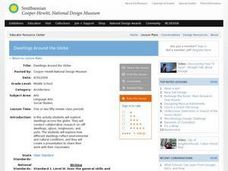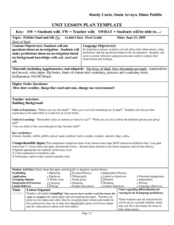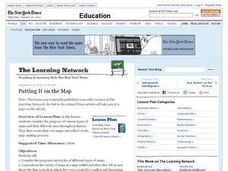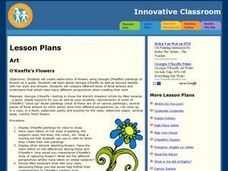Curated OER
The Fight for Human Rights
Students explore the concept of human rights by developing and defending their own 'Bills of Human Rights' and by writing a reflective essay that compares their notions of human rights and the protection of them.
Curated OER
Spanish-American War
Pupils view a video called Battling Beyond the Borders about the Spanish-American War. They discuss the role of newspapers in the war and then analyze political cartoons of the time, writing explanatory sentences about them.
Curated OER
Soldiers' Stories
Students share opinions about the conditions under which they might risk their lives for a cause. They write letters from the perspective of soldiers and family members during a tour of duty.
Curated OER
Living the Dream?
Students consider the stories of two immigrants and translate their past, present and future into original pieces of writing or artwork.
Curated OER
Playing it Safe
Students explore the importance of an election and act as political advisers for an upcoming election. Students create platforms for various candidates, by writing a letter to their candidate with suggestions for winning the election.
Curated OER
Unplugged
Students read the article "Power From the People Breaks the Hold of Batteries and Plugs." Students work in groups to examine various sources of power. Students debate the advantages and disadvantages of each power source. They assume the...
Curated OER
Pictures of the Past
Young scholars explore how women's roles in society have changed over time. They create a personal timeline using photographs and pertinent dates and complete a reflection paper sharing their views on the roles of women in society past...
Curated OER
Animal Explorations
Young scholars discover compassion for animals. For this animal lesson, students go to a local animal welfare organization and help out. They reflect on compassion and how to make changes in the lives of animals.
Curated OER
An Introduction to the Season for Nonviolence
Fourth graders create a Venn diagram and a cause and effect graphic organizer on Gandhi and King. In this non violence lesson plan, 4th graders compare the two non violent leaders and discuss and articulate non violent protests and write...
Curated OER
If You Can’t Stand the Heat
Young scholars design and build their own solar cooker. In this math lesson, students determine the relationship between the angles of the sun, reflection and cooking time of the solar cooker. They test their project, collect data...
Curated OER
A Faith of Their Own
Students examine various topics related to womens' roles in Syria's Islamic revival. After reading and discussing an article on the subject, they participate in a fishbowl discussion and write an essay about traditions in their own lives.
Curated OER
Dwellings Around the Globe
Students explore dwellings around the globe and conduct collaborative research on cliff dwellings, igloos, longhouses, and yurts. They then explore how different dwellings reflect environmental and cultural conditions, and they create a...
Curated OER
Making a Difference
Students create a plan to better their school. In this civil service lesson, students will deepen their understanding of the term "philanthropy" by reflecting on Martin Luther King, Jr's "I Have a Dream" speech and a quote by John F....
Curated OER
Irish Literature Scavenger Hunt
Fourth graders locate and evaluate various books, journals, anthologies, and Internet sources that contain information that may be used in answering the scavenger hunt questions related to Ireland and Irish literature.
Curated OER
Smallville Prairie Development Project
Students research the characteristics of the prairie habitat focusing on scientific, social/historical and aesthetic values. They investigate how humans impact the prairie habitat while maintaining a daily journal of research and...
Curated OER
Renewable vs. Non-Renewable Resources
Fifth graders, after brainstorming why conservation of resources is important, distinguish between renewable and non-renewable resources. They make a list of different types of natural resources on the board and then sort them into two...
Curated OER
Pebbles Sand and Silt
First graders investigate soil, sand and silt. In this environment lesson, 1st graders discuss how changes occur in the environment and the effects of weather. Students perform their own investigation and record their predictions,...
Orange County Department of Education
Dear Mr. Henshaw
Fifth graders read Dear Mr. Henshaw and identify the character trait of self-respect as exhibited by Leigh throughout the story. They evaluate the author's use of letters to tell the story and discuss how the story would be different if...
Curated OER
Miracles of the Heart
Students watch a movie. In this cultures lesson, students read A World Without Black People and then discuss segregation. Students watch the video Partners of the Heart or Something the Lord Made and then reflect on the video in their...
Curated OER
Pardon Me, Please
Students research capital punishment policies supported by leaders who have issued pardons, then reflect on how executive pardons might affect the balance of power between the branches of government.
Curated OER
From Whose Perspective?
Young scholars critically analyze news coverage of Palestinian-Israeli violence by comparing information from a variety of news sources. They compose expository essays reflecting on how to obtain accurate, unbiased, and credible...
Curated OER
Putting It on the Map
Students consider the purpose of various types of maps and their different uses throughout history. They create their own maps and reflect on the map-making process.
Curated OER
A Class Divided
Students view a documentary about racism and discrimination against people of color. They discuss the film, identify ways in which they can combat racism, complete worksheets and consider how racial tensions are reflected in society.
Curated OER
O'keefe's Flowers
Students participate in a lesson plan about the artist Georgia O'keefe by examining here artwork as a model for style. The art is displayed and students are allowed the time to paint their own paintings. Then they write a journal about...





